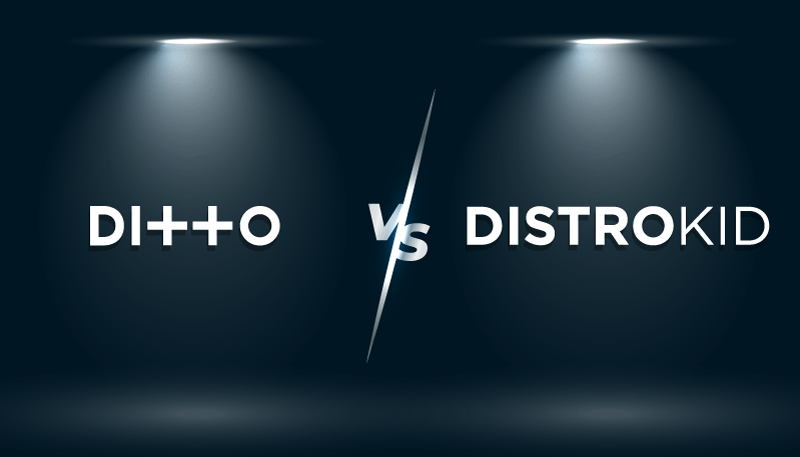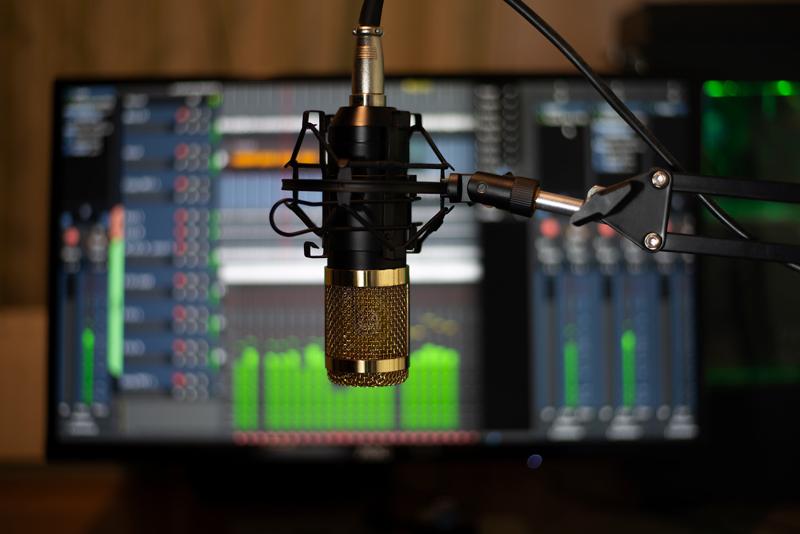DistroKid or Ditto Music, which one to choose? Or maybe I should use another music aggregator? This question bothers every independent musician at the beginning of their music career.
Aggregators help you manage your releases and profit, they offer an easy way for your songs to appear across music stores and streaming services.
In this article, we’ll discuss the differences between two popular music distribution platforms that work based on a fixed fee business model, and allow you to release unlimited songs: DistroKid and Ditto.
Why do I need a music distribution company at all?
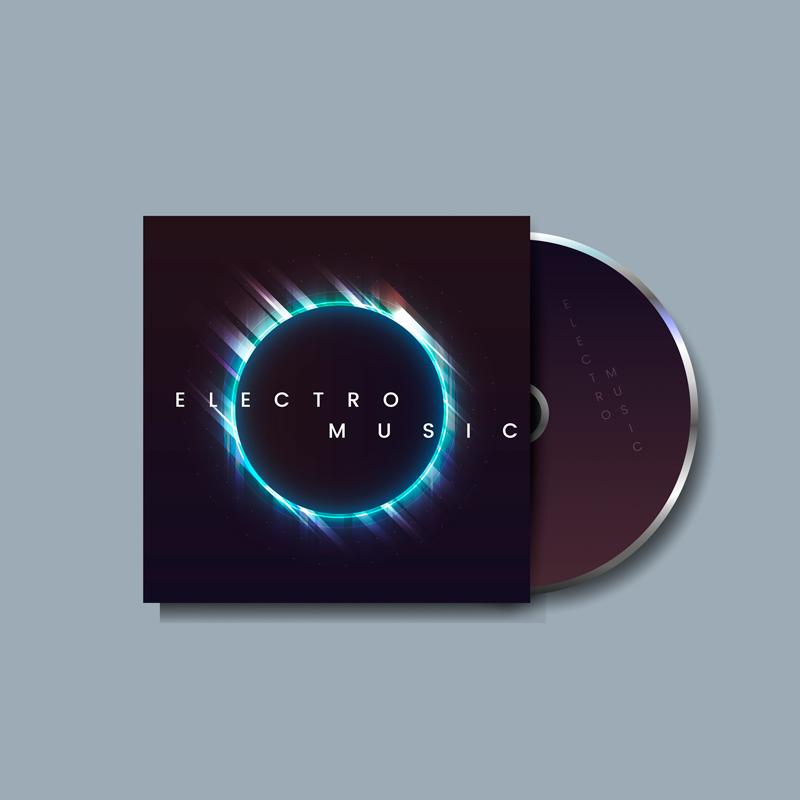 You need to release your songs to the world. But there are hundreds of stores and digital distributors like Spotify, Amazon Music, Apple, and others.
You need to release your songs to the world. But there are hundreds of stores and digital distributors like Spotify, Amazon Music, Apple, and others.
Physical distribution, in addition to digital, may be considered, like selling your CDs or vinyl records.
Besides, social media platforms such as Facebook and Twitter are excellent ways to promote your music.
Many digital distributor platforms, like Spotify, for example, only allow aggregators and labels to distribute music on them. So, unless you create your own label, you won’t be able to distribute your music directly to streaming platforms, you need a middleman.
That’s why you need to choose an aggregator. The company will mirror each of your uploaded songs to every digital distribution platform and store you want and, at the same time, will take care of legal issues, show statistics, and collect and pay you your royalties and other revenue.
Can I use Ditto and DistroKid at the same time?
Before we compare Ditto vs DistroKid, you may ask, why choose? Can’t I use several distributors to release music and free myself from the burden of decision-making?
Well, technically, you can use several distributors, but you can not distribute the same song using both of them.
And practically, it’s much cheaper and easier to pick just one aggregator and entrust the distribution of your music to it. Usually, artists choose one aggregator, because it makes much more sense.
Is Ditto a good distributor?
 Some may say, “Wait, you compare Ditto vs DistroKid like they are on the same level, however, when you look at the popularity charts, DistroKid wins. DistroKid is usually presented within the first five best music distributors, whereas Ditto gets in the first ten. Why do we even consider comparing them?”
Some may say, “Wait, you compare Ditto vs DistroKid like they are on the same level, however, when you look at the popularity charts, DistroKid wins. DistroKid is usually presented within the first five best music distributors, whereas Ditto gets in the first ten. Why do we even consider comparing them?”
Well, first of all, Ditto is a reliable and popular music distributor, endorsed by such famous artists as Ed Sheeran and others.
And although there were reported customer service issues with Ditto in the past, the information about Ditto having a bad reputation is definitely outdated. The service is rapidly growing and adding new features; it currently has more than 700,000 active users.
Besides, Ditto and DistroKid have similar subscription plans with unlimited releases, and roughly the same price, so it makes sense to compare them.
So, keep reading to find lots of useful information about how these two distributors are functioning and what they offer, and you’ll be able to make an informed choice about with whom to go.
What’s wrong with DistroKid’s website?
 Considering going with DistroKid as their music distributor, the first thing most people would do is go to the website to learn more about it.
Considering going with DistroKid as their music distributor, the first thing most people would do is go to the website to learn more about it.
However, to your surprise, you’ll see what seems to be just a landing page with minimum information, no site menu, and the offer to subscribe to the service. Some customers complain about the not very pretty design of the personal account page as well.
If you do want to read what the DistroKid team says about their services on the website, you need to scroll down to the footer of the page and click on the little FAQ link. This will open the whole set of articles that tell future customers about the distributor’s services.
However, design flaws are just DistroKid’s style of working with the site, and don’t affect the quality of their music distribution.
The prices of DistroKid and Ditto Music
Both music distribution companies offer you a pretty cheap annual subscription with an unlimited number of releases.
💰Price for Ditto services
The price is low, the Starter plan is €19 per year with unlimited songs.
The Pro plan for €59 per year for two artists offers a lot of additional features like collecting publishing royalties, YouTube content id, and more.
There’s also a Label plan starting from €89 per year for a record label (5+ artists).
It’s worth noting that Ditto offers a 30-day free trial with Starter plan, you can just subscribe and look around to see how you like it.
💰The price for DistroKid
Basic DistroKid services are available for you for a yearly subscription of $22.99 (Musician plan). this plan is for one artist or band.
More services are included in the Musician Plus plan, which is $39.99 yearly, and you will probably want this plan. It can include 2 artists/bands.
The Ultimate plan starts from 5 artists/bands and up to 100, the cost grows respectively starting from $89.99.
What happens if you want to cancel your subscription?❌
If you stop paying the annual fee, DistroKid and Ditto may remove your songs from the outlets.
With Ditto, you just have to keep on with the subscription or your songs might be removed, there’s no third option. DistroKid offers the third option: “Leave a Legacy”.
DistroKid’s “Leave a Legacy”
To keep your songs online, if you stop the DistroKid subscription, you’ll need to pay a fee called “Leave a legacy”, which is $29.00 per single, $49.00 per album of 2+ tracks (nonrecurring fee) to keep in the shops (on the platforms). If you’ve entered a Legacy payment, the song will be on even after you die and virtually forever.
However, as you can see, if you have a lot of songs working on the platforms, it’ll be much cheaper to just continue the subscription plan.
Remember that after canceling the subscription, you will continue collecting royalties through the distribution platform for some time using your personal account.
You can move to another distribution company
You can also move your music from one distributor company to another. This is a little bit of a troublesome process, but it’s executable.
So, of course, if you think that you have made a mistake and chose the aggregator that doesn’t suit you, it’s not the end of the world, you’ll be able to switch to a different one.
However, it’s better to do good research in the first place and choose wisely, you’ll save yourself a lot of time and trouble that way.
Analyzing the numbers: Who will benefit from using Ditto and DistroKid?
 Ditto Music distribution, as well as Distro Kid, work on a fixed payment business model, you have to submit a small amount of money once a year and can make an unlimited amount of releases. This seems like a pretty good deal, better than other distributors’ offers, but wait, don’t jump to conclusions.
Ditto Music distribution, as well as Distro Kid, work on a fixed payment business model, you have to submit a small amount of money once a year and can make an unlimited amount of releases. This seems like a pretty good deal, better than other distributors’ offers, but wait, don’t jump to conclusions.
Let’s do the math. These €19, let’s say for Ditto Music, you pay only for one year. And if you stop your subscription, your songs on the streaming services might be taken down, so you are forced to continue paying.
Now, for the artists who release many songs every year, €19 a year will be a great deal compared to CD Baby’s costs, for example. CD Baby charges from $9.95 for a simple release to $49.99 for more features, per song or album.
However, let’s say that you are not sure if you are going to continue producing music in the future. Maybe a couple of albums is as far as it can get. So, if you release 2 albums a year, with CD Baby it would cost you $100 with the advanced release, but with Ditto Music, it would still be €19 every year, so in ten years it will add up to almost €200, and you’ll continue paying in the future.
However, if you release many songs every year and plan to continue being productive and popular, a fixed annual price becomes very much more profitable. Moreover, if you take into account that Ditto and DistroKid return 100% of your royalties and sales the option will look even more appealing.
So, you see that aggregators with a fixed annual fee suit productive artists very well. However, are not a great option for rare or one-time releases, in this case, an artist can use other distributors.
Spotify, Apple Music, and others: where and when will your music appear?
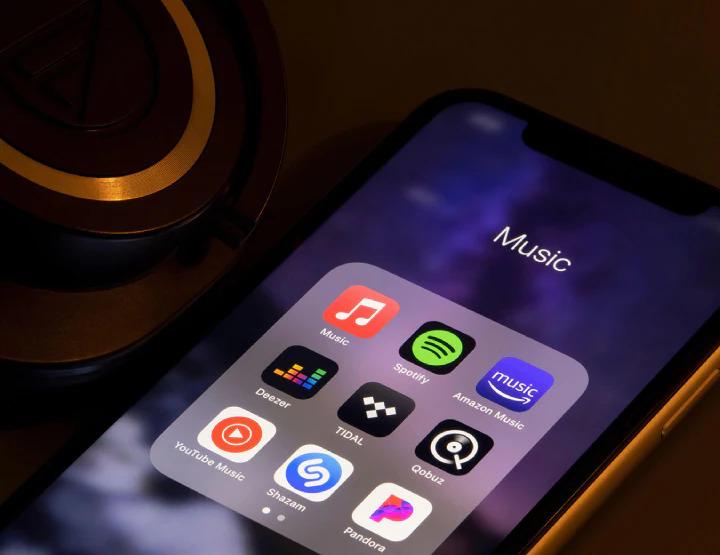 If you subscribe to Ditto or DistroKid, your songs will appear across all major streaming platforms and many more. This is just a short list of where your fans will be able to find your creations:
If you subscribe to Ditto or DistroKid, your songs will appear across all major streaming platforms and many more. This is just a short list of where your fans will be able to find your creations:
- Major streaming services like Spotify, Apple Music, Tidal, Deezer, Amazon Music, Pandora, and others.
- Social network platforms like Facebook, Instagram, TikTok, Snapchat, and others.
- All sorts of YouTube opportunities like YouTube music and YouTube shorts.
- VEVO. You can put each of your music videos on VEVO. Distributors have a special paid option for that.
In the terms of how many services and shops the aggregators distribute to, DistroKid is not necessarily a leader. Ditto used to have a smaller set of services, that’s true, but now it claims to have partnered with all the major streaming platforms, and is distributing songs to more global music platforms than DistroKid does. The difference is especially in covering the Chinese market well, some artists might find this Ditto’s feature useful.
With Ditto Music, you can easily specify the platforms you want to release your song on, and geographic criteria (in what countries you want it to be available). DistroKid allows you to easily choose only the platforms, it’s more difficult with them to specify the geographic restrictions. However, with the current level of globalization, this may not be needed much.
How far is the release date: DistroKid vs Ditto
With Ditto, you can set a release date of 10 days and more after you upload your song. You can pay some extra fee for making it 74 hours instead of 10 days, but only for five major platforms. Ditto calls it Express Release service.
DistroKid offers artists to set a custom release date if they use Musician Plus or a higher subscription plan. However, your song will still appear on the streaming service “as soon as possible”, which DistroKid describes in their chart of how quick the release date can be. In short, they say, they can release the music to streaming services within one week (for Amazon, YouTube Music, Deezer, and TIDAL even within 2 days), and to social network platforms within 3 weeks.
So, as you see, releasing music is not a quick task, but DistroKid in this case is a bit faster.
The best part: how you get paid
Both Ditto and DistroKid music distribution services pay 100% of your royalties which is fantastic, you’ll definitely love it.
 💎Payment methods
💎Payment methods
DistroKid allows you to choose your preferred payment method, and PayPal is an option. And then, DistroKid will send you the money using the method you have chosen.
With Ditto, you can see money in your Ditto account and can withdraw, once the amount is greater than £25. The payment methods include PayPal and major credit cards.
💎Ditto pays quicker
The users claim that Ditto pays artists their revenue quicker than DistroKid.
This seems like a great advantage, but keep in mind, however, that aggregators are not able to pay musicians their royalties quicker than they are released by collection societies, which can take 2-6 months, and this delay will be not the distributor’s fault.
💎Ditto helps with publishing royalty collection
Additionally, Ditto Music allows you to receive publishing royalties (the royalties you get as an author of music and/or lyrics).
If you want Ditto to take charge of collecting publishing royalty for you, it’s necessary to have a Pro subscription plan.
Ditto registers all your music around the world and even promotes it to be used on radio and TV to get more publishing royalties.
However, Ditto will keep 10% of your publishing royalties.
At the same time, DistroKid doesn’t help artists collect their publishing royalties, it only collects streaming royalties.
Special features of Ditto Music and DistroKid
Both music distribution services have some extra features that are worth noting. Let’s look through some of them to add details to our comparison of DistroKid vs Ditto.
YouTube content ID
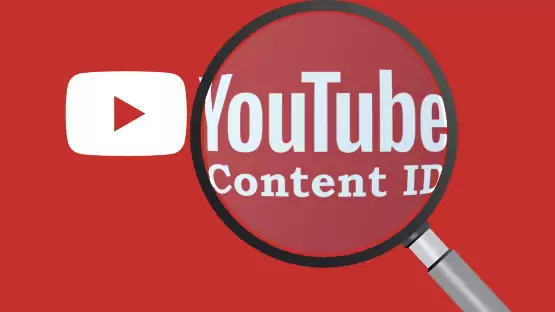 The content ID is a possibility for you to receive money from YouTube ads when other people post your music on YouTube. When a musician enables Content ID for their music, YouTube will scan all videos uploaded to the platform to identify any matches with this music.
The content ID is a possibility for you to receive money from YouTube ads when other people post your music on YouTube. When a musician enables Content ID for their music, YouTube will scan all videos uploaded to the platform to identify any matches with this music.
If a match is found, the musician can choose to either block the video or monetize it by allowing advertisements to appear on the video. If they choose to monetize the video, YouTube will share the advertising revenue with the musician or their label.
Both Ditto and DistroKid offer YouTube content ID services. However, Ditto’s offer is included in the Pro subscription plan, while DistroKid charges for enabling content ID, and, in addition, 20% of the revenue it generates.
HyperFlow from DistroKid vs smart links from Ditto
DistroKid offers this unique special feature of smart links. It’s generated automatically after you make a release and contains the links to your song on all the major platforms.
You can post the link to this page in your Instagram bio, for example, and your fans will be able to click on it and see all the links to your release and listen to your song on their favorite streaming service.
You can edit this page manually, and add more links to it, some information, and other things.
Additionally, DistroKid gathers and gives back to the artist some statistics about the people who visited the HyperFlow page.
The Smart Links page from Ditto lacks some functions that are present in HyperFlow, so regarding this, DistroKid wins.
On the downside, these pages look pretty simple, so you can easily make a prettier set of links for your music with various other services.
Besides, the link pages don’t hide promoting the distribution service that generated them. So, in this case, it’s not clear, whether the distribution service is promoting the artist or is using the artist to promote itself.
On the other hand, most artists love the feature because it’s convenient, auto-generated, and saves them time.
Distribution to VEVO
 Ditto offers you to distribute your music videos to VEVO right away starting from the simplest subscription plan. However, you’ll need to pay £99 to set up a VEVO channel. The first video you upload for free, but you’ll pay £29.99 for every video after that.
Ditto offers you to distribute your music videos to VEVO right away starting from the simplest subscription plan. However, you’ll need to pay £99 to set up a VEVO channel. The first video you upload for free, but you’ll pay £29.99 for every video after that.
DistroKid doesn’t have this option with the standard subscription, instead, DistroKid launched a separate product called DistroVid, which is a standalone service designed specifically for music video distribution across platforms. It provides more specialized tools, including customizable video thumbnails, automatic closed captioning, and social media sharing tools.
To be able to distribute to VEVO with DistroKid, you’ll need to subscribe also to DistroVid, which costs $99 per year. It will allow you to upload an unlimited number of music videos (for one artist) to Apple Music, Vevo, Amazon Music, and Tidal.
Both distributors then return 100% of your earnings from streaming your songs through VEVO.
Automatic split payments
Ditto Music and DistroKid facilitate splitting payments between band members and co-creators. You can do it easily, right in your account on either platform.
Releasing cover songs with DistroKid is easier
If you wish to release a cover song, DistroKid will take care of all the cover song licensing for you. It’s possible to release covers with Ditto Music as well, but it’s a bit more complicated, and you’ll have to take care of some steps yourself.
Your own ISRC
You’ll need to bring your own ISRC codes in several cases, particularly if you are migrating from another aggregator.
Both platforms will generate ISRC codes for your compositions for free. However, if you need to bring your own ISRC, you can do it with the simplest subscription plan with Ditto, and you have to upgrade to the Musician Plus plan with DistroKid.
Only digital distribution with Ditto and DistroKid
And in the end, let us remind you that these aggregators work with digital streaming and shops. They will not help you with releasing and distributing your music on CDs or vinyl.
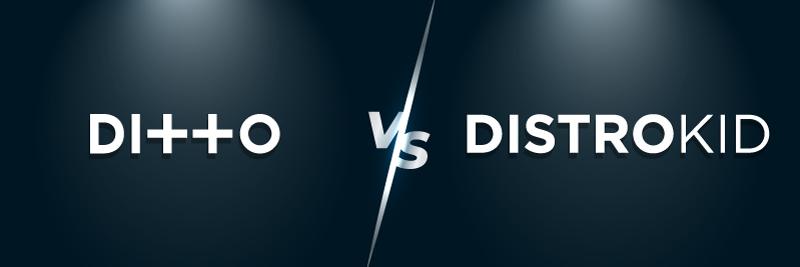 Is DistroKid better than Ditto?
Is DistroKid better than Ditto?
Having looked through the services Ditto Music and DistroKid offer, we can conclude that DistroKid is not a much better distributor than Ditto Music. Artists will find benefits in working with each of them. Being competitors with very similar subscription plans and services, they both upgrade constantly with new features and options for artists.
Want a free test mix of your track?
We get it.
That’s why we’ll do a full hybrid (analog + digital) mix of your song —
for free.
No upfront payment. No risk.
You only pay if you’re blown away. And if you are, we’ll slash 40% off the final price.
Nobody else in mixing and mastering offers this.
Why?
Because most studios say yes to every project. We don’t. We only mix what we’re excited about — so send us your best track. If we like it, we’ll mix it like it’s going to the Grammys.
👉 Just drop your name and email to get started.
Let’s quickly review the main points of DistroKid vs Ditto Music:
- Music aggregators with fixed annual fees like Ditto and DistroKid suit productive artists very well. However, are not a great option for rare or one-time releases.
- They both work only with digital music distribution, not physical.
- The distributors do very little to promote you, they concentrate on distributing your work.
- The simplest Ditto subscription costs €19 per year. DistroKid has a similar price for the cheapest subscription, but it includes fewer services. You’ll probably need the DistroKid’s Musician Plus plan, which is $35.99 yearly.
- Ditto Music offers a 30-day free trial option.
- Ditto and DistroKid music distribution services pay 100% of your royalties.
- Both allow several methods for you to receive payments, including PayPal and credit cards.
- They distribute your music to all major platforms and more than a hundred other streaming services and shops. However, Ditto has an additional advantage with global platforms and in the Chinese market.
- Both distributors allow to specify the set of platforms for release, but Ditto additionally works with the geographic release restrictions.
- Both release your music quickly, but DistroKid is faster.
- Ditto Pro artists also receive publishing royalties as part of their subscription, and Ditto Music Publishing keeps 10% commission of their publishing royalties. At the same time, DistroKid doesn’t help artists collect their publishing royalties at all, it only collects streaming royalties.
- Ditto and DistroKid offer artists YouTube content ID services. However, Ditto’s offer is included in all subscription plans, while DistroKid charges for enabling content ID, and, in addition, keeps 20% of the revenue it generates.
- The distributors create a page with smart links for a released song, however, DistroKod’s HyperFlow page gives the user more options to customize it.
- Both distributors help you upload videos to VEVO, and then return 100% of your earnings from streaming your songs through VEVO. However, you’ll have to pay for VEVO, they both have different payment plans for that.
- DistroKid has an additional DistroVid service that costs $99 per year. It will allow you to upload an unlimited number of music videos (for one artist) to Apple Music, VEVO, Amazon Music, and Tidal. It also has a lot of features to facilitate working with videos.
- Ditto Music and DistroKid both support splitting payments between band members and co-creators.
- Your own ISRCs are supported by Ditto Music in all subscription plans, and only starting from the Musician Plus plan by DistroKid.
Looking at these points and all that we have discussed, you’ll need to choose yourself, whether these distributors are good for you, and if yes, then which one. You’ll choose based on your requirements and preferences as an artist. However, we hope, that this article helps you make the correct decision.
The only way to succeed: work with the masters!
In the music industry today, it’s crucial to choose the effective marketing strategy and the right distributor company, that’s why we chose this topic for our blog.
However, as an artist, if you put a lot of effort into recording great songs, developing your image and brand, and releasing your music into the world, it would be a shame to fail because of bad mixing and sound quality. Because they are expected to be exceptional!
If you set out to win in the music world, your songs have to be on the same level as chart-toppers today. Besides, the industry trends change quickly, but don’t worry, we keep track of what is required from your music at the moment.
We at our Major Mixing studio, keep our hand on the pulse of the music world, our mixes are made with all today’s standards to achieve great results.
So, if you are an independent artist or a band, it will be a wise decision to use professional mixing and mastering services. You create a song – we make a perfect master record for you. Contact us now, we are always happy to help you succeed!

